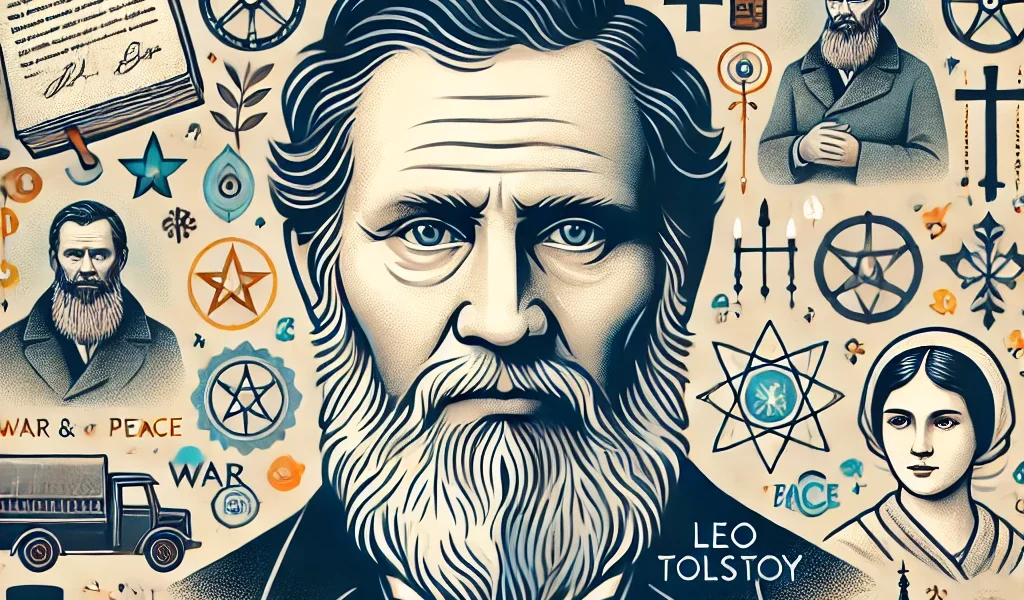Leo Tolstoy, one of the most revered writers in world literature, is known for his epic novels that capture the complexity of human nature and the intricacies of Russian society. His masterpieces, War and Peace and Anna Karenina, continue to be celebrated for their deep philosophical insights and rich narrative style. Tolstoy’s impact, however, extends beyond literature; his ideas on spirituality, morality, and pacifism have had a profound influence on intellectual thought around the world.
In this article, we will explore Tolstoy’s life, his major works, his philosophical ideas, and the enduring legacy of one of the greatest writers in history.
Early Life and Education
Lev Nikolayevich Tolstoy, born on September 9, 1828, in the Tula Province of Russia, came from an aristocratic family. He was the fourth of five children, and his parents both passed away by the time he was nine. Tolstoy was raised by relatives, and despite his privileged background, he grew up with a keen awareness of the inequalities in Russian society.
Tolstoy initially studied law and Oriental languages at Kazan University, but he found the academic system unsatisfying and soon dropped out. In his early twenties, he took up a lifestyle typical of Russian aristocracy, indulging in gambling, heavy drinking, and bouts of irresponsibility. However, during this period, he also began writing.
Literary Beginnings
Tolstoy’s literary career began with his semi-autobiographical novel Childhood (1852), which he wrote while serving in the military during the Crimean War. The novel was well-received and was followed by Boyhood and Youth, forming a trilogy that reflects the moral and psychological development of a young boy. These early works showed signs of Tolstoy’s later preoccupation with moral questions and social critique.
Military Service and Early Travels
Tolstoy’s time in the Russian army played a significant role in shaping his worldview. He witnessed the horrors of war firsthand, an experience that would later influence his anti-war stance and his masterpiece War and Peace. After leaving the army, he traveled across Europe and was deeply inspired by Western philosophical thought, particularly the works of Jean-Jacques Rousseau. This period of reflection marked the beginning of Tolstoy’s interest in moral and ethical questions, setting the stage for the evolution of his personal philosophy.
Major Works: War and Peace and Anna Karenina
Tolstoy’s reputation as a literary giant is largely founded on two monumental works: War and Peace and Anna Karenina.
War and Peace (1869)
Widely regarded as one of the greatest novels ever written, War and Peace is an epic narrative that spans from 1805 to 1820, covering Napoleon’s invasion of Russia. The novel interweaves the lives of fictional characters, such as Pierre Bezukhov and Natasha Rostova, with historical figures like Napoleon and Tsar Alexander I.
Tolstoy masterfully blends historical detail with philosophical musings on fate, free will, and the meaning of life. His exploration of the interconnectedness of human existence, along with his deep insights into the psychology of his characters, set this work apart as a cornerstone of world literature.
Anna Karenina (1877)
Tolstoy’s second major novel, Anna Karenina, is a tale of love, infidelity, and moral conflict. The novel centers on the tragic love affair between Anna, a married woman, and Count Vronsky, set against the backdrop of 19th-century Russian aristocracy.
While Anna Karenina explores themes of passion and betrayal, it also delves into societal expectations, the role of women, and the contrast between rural and urban life in Russia. Tolstoy’s portrayal of Anna’s inner turmoil and the consequences of her choices remains one of the most powerful depictions of human emotions in literature.
Tolstoy’s Spiritual and Philosophical Transformation
In the later part of his life, Tolstoy underwent a profound spiritual crisis, which led him to renounce many of his former beliefs. He became deeply religious and adopted a Christian anarchist philosophy, rejecting the dogma of the Russian Orthodox Church and the materialism of society. Tolstoy’s beliefs became known as Tolstoyanism, a moral philosophy that emphasized simplicity, non-violence, and living according to the teachings of Jesus Christ.
Non-Violence and Pacifism
Tolstoy’s ideas on non-violence, particularly his belief in the principle of non-resistance to evil, had a profound impact on the world. His writings, such as The Kingdom of God is Within You (1894), influenced key figures like Mahatma Gandhi and Martin Luther King Jr., who adopted Tolstoy’s philosophy of passive resistance in their own struggles for social justice and equality.
Rejection of Materialism
After his spiritual awakening, Tolstoy denounced his earlier aristocratic lifestyle. He became increasingly critical of private property, wealth, and the social inequalities they created. His later works, such as Resurrection (1899), reflect his deep concern for the plight of the poor and the corrupting influence of materialism on human morality.
Family and Personal Life
Tolstoy’s personal life was marked by both success and turbulence. He married Sophia Behrs in 1862, and they had 13 children, though not all survived infancy. Sophia played a significant role in her husband’s career, particularly in transcribing and editing his works.
However, as Tolstoy’s spiritual beliefs became more extreme, tensions grew in their marriage. Sophia struggled to accept her husband’s renunciation of wealth and material comfort, which led to significant conflicts between them.
Legacy and Influence
Tolstoy passed away on November 20, 1910, at the age of 82, leaving behind an extraordinary legacy. His works have been translated into numerous languages and continue to inspire readers and thinkers worldwide.
Influence on Literature
Tolstoy’s narrative techniques, psychological depth, and philosophical explorations have left an indelible mark on literature. Writers such as James Joyce, Virginia Woolf, and Marcel Proust have cited Tolstoy as a key influence in their own work.
Influence on Social Movements
Tolstoy’s ideas on non-violence and pacifism have transcended literature, influencing major social and political movements in the 20th century. Gandhi’s campaign for Indian independence and Martin Luther King Jr.’s leadership of the civil rights movement in the United States both drew heavily on Tolstoy’s writings on peace and moral justice.
Conclusion
Leo Tolstoy’s contributions to literature and philosophy are unparalleled. His epic novels War and Peace and Anna Karenina offer profound insights into the human experience, while his spiritual writings have influenced social and political movements around the globe. Tolstoy’s exploration of moral and philosophical questions, combined with his literary genius, has cemented his place as one of the greatest writers in history.
As readers continue to engage with Tolstoy’s work, his timeless themes of love, morality, war, and peace remain as relevant today as they were during his lifetime.



